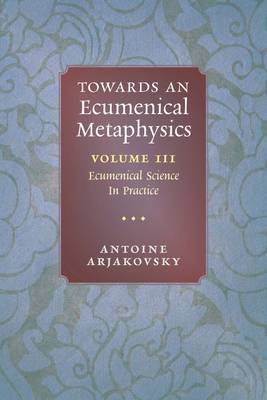
- Afhalen na 1 uur in een winkel met voorraad
- Gratis thuislevering in België vanaf € 30
- Ruim aanbod met 7 miljoen producten
- Afhalen na 1 uur in een winkel met voorraad
- Gratis thuislevering in België vanaf € 30
- Ruim aanbod met 7 miljoen producten
Towards an Ecumenical Metaphysics, Volume 3
Ecumenical Science In Practice
Antoine ArjakovskyOmschrijving
The World Council of Churches does not limit its conception of ecumenism to what unites or divides Christians. In a famous 1997 text entitled "Common Understanding and Vision," ecumenism is more broadly defined as "everything that relates to the whole task of the whole church to bring the gospel to the whole world." Moreover, further steps have since been taken toward integrating other religions and faith traditions, leading to a new discipline offering a fully realistic and fully spiritual ecumenical perspective on the world, founded on ecumenical metaphysics and epistemology. This perspective applies to all realities of this world-from the mysteries of faith and spiritual practice to questions of international relations and ecology. It does not deny the originality of the classical, modern, or post-modern paradigms as found in all spiritual collectivities past and present upon our earth. Rather, it integrates them into a deeper, more personal, more sapiential, more transdisciplinary, and more eschatological logic. From this new perspective, the ecumenical movement is no longer aimed at constructing a vast worldview in which each individual might lose conviction in their personal orientations. Instead, we seek now a "loving gaze" focused on the actual, living faith of individuals. The power of this gaze knows no bounds: may it help make visible and joyously ring in the coming of the Kingdom of God on earth.
Specificaties
Betrokkenen
- Auteur(s):
- Uitgeverij:
Inhoud
- Aantal bladzijden:
- 234
- Taal:
- Engels
Eigenschappen
- Productcode (EAN):
- 9781621389019
- Verschijningsdatum:
- 9/02/2023
- Uitvoering:
- Paperback
- Formaat:
- Trade paperback (VS)
- Afmetingen:
- 152 mm x 229 mm
- Gewicht:
- 349 g

Alleen bij Standaard Boekhandel
Beoordelingen
We publiceren alleen reviews die voldoen aan de voorwaarden voor reviews. Bekijk onze voorwaarden voor reviews.











